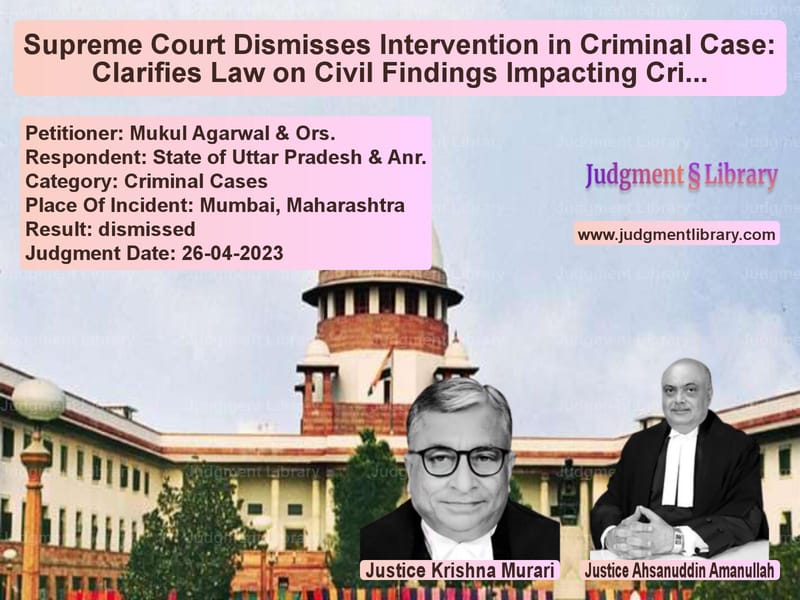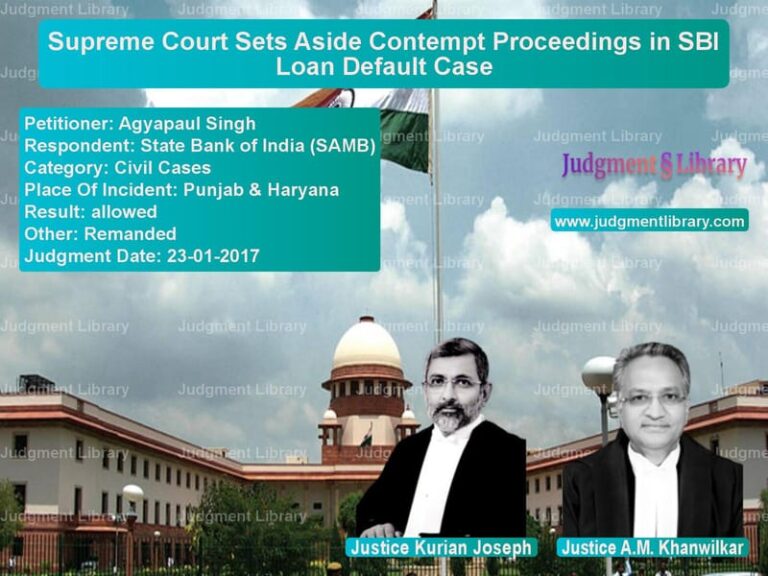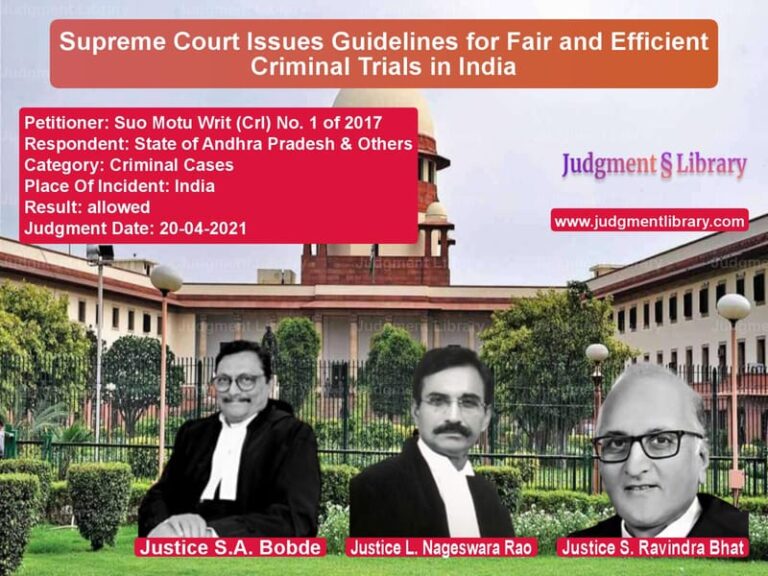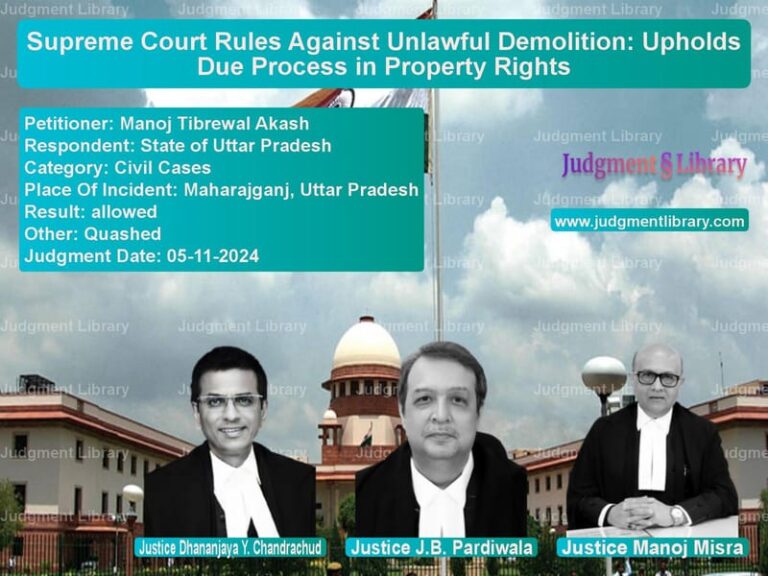Supreme Court Dismisses Intervention in Criminal Case: Clarifies Law on Civil Findings Impacting Criminal Proceedings
The Supreme Court of India recently ruled in the case of Mukul Agarwal & Ors. vs. State of Uttar Pradesh & Anr., addressing an important legal question regarding the applicability of civil court findings in pending criminal cases. The Court dismissed an intervention application by Mukesh Maganlal Doshi, who sought clarification on the Court’s earlier judgment in Criminal Appeal No. 249 of 2020. The ruling underscores the principle that civil court findings can render criminal proceedings void in certain cases, but their applicability must be determined by the appropriate courts.
Background of the Case
The case originated from a complaint filed on 5 March 2019 with the Mumbai police, alleging the unauthorized sale of several building units by business associates of the complainant. This included the sale of seven units to a group associated with the applicant, Mukesh Maganlal Doshi. The complaint also accused the business associates of fraudulently obtaining bank loans.
Key developments in the case include:
- On 19 March 2020, the complainant approached the Central Bureau of Investigation (CBI) with the same allegations.
- On 23 September 2020, an FIR was registered against the complainant’s business associates and others for bank loan fraud, but the CBI did not act on the allegations of unauthorized property sales.
- A commercial suit was filed in relation to the unauthorized sale of seven building units. The matter was settled, and a compromise decree was passed on 16 March 2021, acknowledging that the applicant’s group was a victim of fraud.
- Subsequently, Mumbai police filed a closure report under Section 157 of the Criminal Procedure Code (CrPC), stating that no further investigation was needed regarding the applicant and his group.
Despite the closure report, the applicant’s group was implicated in proceedings under the Prevention of Money Laundering Act (PMLA), leading to the request for clarification from the Supreme Court.
Arguments of the Applicant
The applicant’s counsel contended that:
- The Supreme Court’s judgment in Criminal Appeal No. 249 of 2020 had established that when a civil court’s findings negate the basis of a criminal complaint, the criminal proceedings should be quashed.
- The clarification sought would prevent unnecessary legal proceedings and ensure justice.
- Without a direct application of the Court’s ruling, the applicant would face unwarranted criminal prosecution despite a civil decree confirming that his group was a victim of fraud.
Arguments of the Respondents
The respondent, representing the State of Uttar Pradesh, opposed the intervention, arguing that:
- The Supreme Court’s judgment in Criminal Appeal No. 249 of 2020 was a general legal principle, not a ruling meant for specific cases unless applied by the relevant court.
- It was up to the appropriate judicial forums handling the applicant’s case to determine whether the principles from the previous ruling applied.
- The applicant, who was not a party to the original case in Criminal Appeal No. 249 of 2020, could not seek a blanket clarification from the Supreme Court.
Supreme Court’s Observations
The Supreme Court bench, comprising Justices Krishna Murari and Ahsanuddin Amanullah, made the following observations:
- “The judgment and order dated 10.02.2020 held that findings recorded in civil proceedings can negate the basis of a criminal complaint, making the criminal case liable to be quashed.”
- “However, the applicability of this principle must be determined by the concerned court handling the criminal proceedings.”
- “A blanket clarification from this Court, sought by an individual who was not a party to the original case, is not permissible.”
- “Each case must be evaluated on its own facts to determine whether the law declared by this Court applies.”
Final Judgment
Based on these observations, the Supreme Court ruled:
- The application for intervention was rejected.
- The request for clarification was dismissed.
- The concerned courts must assess whether the principles from Criminal Appeal No. 249 of 2020 apply to the applicant’s case.
Implications of the Judgment
This judgment has significant implications for criminal and civil litigation in India:
- Judicial Autonomy: Courts handling individual cases must assess whether civil findings invalidate criminal charges rather than relying on a general Supreme Court clarification.
- Limits on Blanket Applications: The ruling prevents misuse of Supreme Court judgments by non-parties seeking sweeping clarifications to avoid criminal proceedings.
- Balance Between Civil and Criminal Proceedings: While civil court findings can influence criminal cases, their applicability is subject to judicial scrutiny rather than automatic enforcement.
Conclusion
The Supreme Court’s decision in Mukul Agarwal & Ors. vs. State of Uttar Pradesh & Anr. reaffirms that civil court findings can impact criminal cases but must be evaluated by the appropriate courts on a case-by-case basis. The judgment ensures that legal principles are applied judiciously, preventing blanket dismissals of criminal cases while upholding fairness in judicial proceedings.
Petitioner Name: Mukul Agarwal & Ors..Respondent Name: State of Uttar Pradesh & Anr..Judgment By: Justice Krishna Murari, Justice Ahsanuddin Amanullah.Place Of Incident: Mumbai, Maharashtra.Judgment Date: 26-04-2023.
Don’t miss out on the full details! Download the complete judgment in PDF format below and gain valuable insights instantly!
Download Judgment: mukul-agarwal-&-ors.-vs-state-of-uttar-prade-supreme-court-of-india-judgment-dated-26-04-2023.pdf
Directly Download Judgment: Directly download this Judgment
See all petitions in Bail and Anticipatory Bail
See all petitions in Custodial Deaths and Police Misconduct
See all petitions in Judgment by Krishna Murari
See all petitions in Judgment by Ahsanuddin Amanullah
See all petitions in dismissed
See all petitions in supreme court of India judgments April 2023
See all petitions in 2023 judgments
See all posts in Criminal Cases Category
See all allowed petitions in Criminal Cases Category
See all Dismissed petitions in Criminal Cases Category
See all partially allowed petitions in Criminal Cases Category







